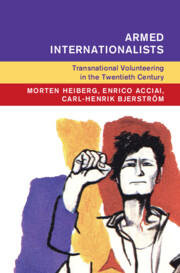Refine search
Actions for selected content:
2 results
1 - Combatants without Borders
-
- Book:
- Armed Internationalists
- Published online:
- 19 September 2025
- Print publication:
- 09 October 2025, pp 1-18
-
- Chapter
- Export citation

Armed Internationalists
- Transnational Volunteering in the Twentieth Century
-
- Published online:
- 19 September 2025
- Print publication:
- 09 October 2025
